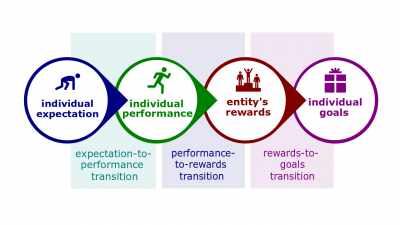Difference between revisions of "Expectancy theory"
(→Related coursework) |
|||
| Line 5: | Line 5: | ||
:[[Expectancy theory]]. A theory that says that the strength of a tendency to act in a certain way depends on the strength of an expectation that the act will be followed by a given outcome and on the attractiveness of that outcome to the individual. | :[[Expectancy theory]]. A theory that says that the strength of a tendency to act in a certain way depends on the strength of an expectation that the act will be followed by a given outcome and on the attractiveness of that outcome to the individual. | ||
| − | ==Related | + | ==Related lectures== |
*[[Human Motivations Quarter]]. | *[[Human Motivations Quarter]]. | ||
[[Category: Septem Artes Administrativi]][[Category: Articles]] | [[Category: Septem Artes Administrativi]][[Category: Articles]] | ||
Revision as of 13:25, 4 January 2019
Expectancy theory (hereinafter, the Theory) is the theory that suggests that an individual tends to act in a certain way based on the expectation that the act will be followed by a given outcome and on the attractiveness to the individual. The path-goal model has been developed based on that Theory.
Definitions
According to Organizational Behavior by Robbins and Judge (17th edition),
- Expectancy theory. A theory that says that the strength of a tendency to act in a certain way depends on the strength of an expectation that the act will be followed by a given outcome and on the attractiveness of that outcome to the individual.
